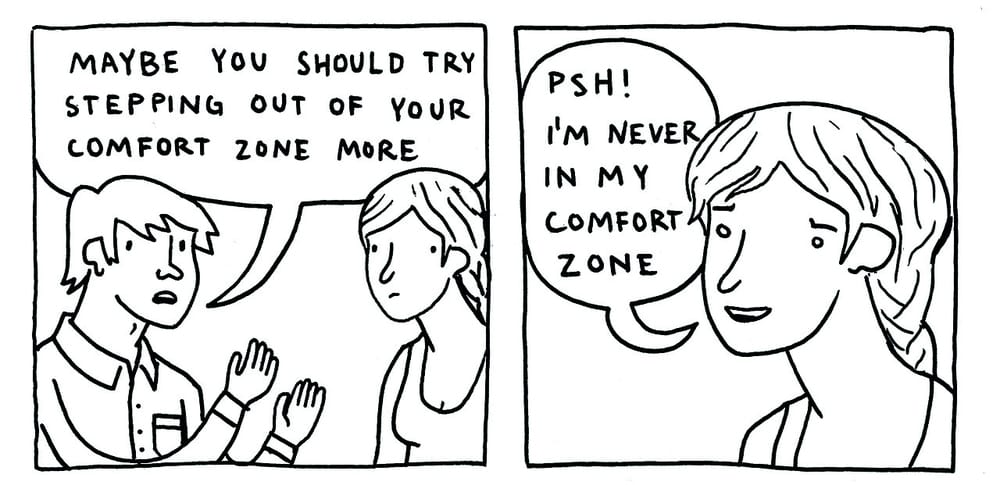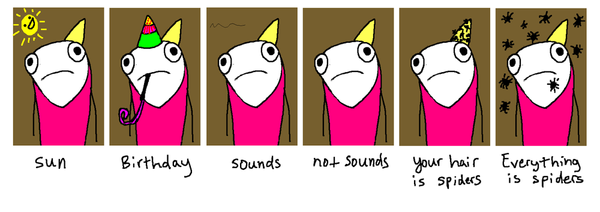Big worries about small problems
An anonymous contributor shares their experience with anxiety and recovery

After all my preaching about de-stigmatising mental illness, I think it’s about time I talked about my own experiences in the hopes that it will help at least one person who is currently suffering and feels like they’re alone. I have struggled with anxiety for as long as I can remember. It is no secret that I’m known as the stressy, anxious, over planner of my circle of friends, and I’ve been known to literally worry myself sick over small disagreements and arguments (once in 7th grade, I spent an entire weekend in bed with a fever because I had had a falling out with my best friend). Now, I never thought I had a problem,
I just thought I took things a little too seriously, but that it was completely normal to burst into tears every time someone shouted at you. I felt like I was just weak, that it was a personality flaw, and that I just needed to ‘man up’ (don’t get me started on that phrase, that’s reserved for a whole different article) or grow out of it, but it never even occurred to me to ask for help or talk to someone, because I was afraid I would just get laughed at, or worse, chastised for seeking attention or whining when there was nothing really wrong. It didn’t even matter that much, I was living at home with my parents, I was coasting through school and despite a few hiccups, I was mostly getting by alright.
It wasn’t until I came to university that things started getting noticeably worse. I was suddenly thrown in an environment where I was finally being challenged academically, and I’m not going to lie, I was struggling for the first time in my academic career. The perfectionist tendencies that I’d, you know, perfected, over the past twelve years of my academic life meant that I would become paralyzed every time I made a mistake or was given feedback that showed I was anything less than perfect (which was, unsurprisingly, very often).
I had my first panic attack during my 2nd year programming exam. One moment I was trying to code a struct and the next I was gripped with fear, with my heart attempting to make a hurried escape from my chest. Now, for those of you who’ve never experienced panic attacks (and I hope that’s most of you), it legitimately feels like you’re about to die. Breathing became difficult, I couldn’t hear anything over the buzzing in my head, there was a metallic taste in my mouth, and most strangely, I felt like I was watching all this happen to me. Nothing felt real. I would later find out that this depersonalisation is a normal symptom of a panic attack but at the time, it was the most terrified I had ever been. I sat there gripping the mouse for a good twenty minutes, trying my hardest to just breathe, before the fear started to subside. By the time I could finally think clearly again, there was only half an hour left to the end of the exam, and I rushed to finish all that I could, trying to hold back my tears enough to see what I was doing. The moment we were allowed to leave, I bolted for the bathroom, had a good cry, and then went on with the rest of my day, still frazzled but not saying a word to anyone.
My biggest mistake that day was not going straight to my academic tutor and telling him what had happened, but I just didn’t think that I could. What would I say? That I had suddenly gone into some trance and couldn’t do my exam? I had no idea what a panic attack was, I had never heard of anyone having one, or what it was like, so I had nothing to go on. I didn’t think anyone would believe me, or worse, that they’d tell me to grow up and stop making excuses.
Things only got worse after that first incident. Every time I was in a similar, stress-filled situation, I would feel the familiar fear tighten its grip on me, and I would be back to the whimpering mess I was in that stuffy computer lab. It wasn’t long before I was dreading even going to small tests because just the thought of having a panic attack would send me reeling off the edge.
I had trouble sleeping, I was lucky if I could get three hours of rest a night, I would snap at everyone around me, lie to my friends and family about what was wrong, and constantly talk down to myself because I thought I was just being a wimp and overreacting to things.
It took almost a year before my boyfriend finally convinced me to see a college counsellor, and when that didn’t work, to contact my GP, and that was only after I confided in him about just how many times I’d considered ending my life. After that first GP appointment, and the diagnosis of saying I had anxiety disorder that everything started making sense. I finally knew what was wrong with me! There was a name for what I was going through, and it turned out to, unfortunately, be a much more common condition than I could have ever imagined. Although there was still a long way to go to recovery, just the fact that I knew what was wrong came as a huge relief.
I was put on a waiting list for Cognitive Behavioral Therapy, was prescribed antidepressants, finally told my department about everything that had been happening and started getting the support I so desperately needed. I won’t lie and say that everything suddenly got better, and that I stopped feeling terrible and everything was instantaneously dandy; almost a year later and I still sometimes have to leave lectures in a hurry because I’ve started hyperventilating, but now I know that it passes. I know that it gets better, no matter how permanent it feels at the time, and that’s enough to get me through another day.
So if there is anything you take away from this, it is that you’re not alone, and as cliché as this sounds, it does get better. Maybe not right away, maybe not completely, and certainly not linearly, but eventually, you’ll learn to deal and you will start to feel better.
So please, if you’re reading this and think that you’re going through something similar, don’t make the same mistake I did and wait until things get catastrophic before seeking out help. Your well-being is the most important thing, and no one who matters is going to judge you for asking for help. There are measures put in place to try and make sure we all get the support we need, so don’t be afraid to use them, and remember, you’re not alone!






